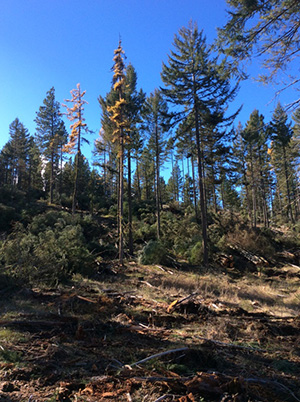
CLEARWATER BEACH, FL — It may seem counterintuitive, but some forests in the Pacific Northwest have too many trees for their own good. These dense forests are more prone to disease, insect infestations and, most troubling of all, huge fires that are exacerbated by climate change. This year is poised to be another record-setting year for fires. Last year was the fourth-worst wildfire year since 1960 and six of the 10 largest U.S. wildfires were in the Pacific Northwest.
At its heart, the Manastash-Taneum Resilient Landscape Restoration Project recognizes that good forest management, which includes responsible harvesting, allows fire-, insect-, and diseaseresistant forests to thrive and also benefits a diversity of species. In recognition of this work, the project received the SFI Leadership in Conservation Award at the Sustainable Forestry Initiative (SFI) 2016 Annual Conference.
“We are so pleased to recognize the Washington Department of Natural Resources (DNR) and the Yakama Nation, both SFI Program Participants, and their partners the Washington Department of Fish & Wildlife, The Nature Conservancy, and the U.S. Forest Service,” said Kathy Abusow, President and CEO of SFI Inc.
The project shows the benefits of using responsible harvesting to return forest ecosystems in the Pacific Northwest to a condition before fire suppression became a dominant feature of forest management in the region. In a recent report, The Nature Conservancy found that about 30% of all forests in eastern Washington are too densely packed with trees and other vegetation.
“These forests will benefit if they are managed in ways that allow them to better tolerate wildfires. Responsible harvesting, followed by controlled prescribed burning, should help reduce crown fires, which are more dangerous and difficult to control. This is a practical way to help mitigate some of the damage that climate change is expected to cause,” said Laura Potash, The Nature Conservancy’s project lead.
In many parts of the Pacific Northwest, a lack of harvesting combined with fire suppression increased fuel loads to dangerous levels. “By looking at historical levels of tree spacing we have information to provide forest managers on the openings needed in a forest to make it less susceptible to catastrophic fire,” said Larry Leach, the Washington DNR Assistant Region Manager for State Lands in Southeast Washington.
The project’s emphasis on removing smaller trees through thinning also offers an ideal mechanism to use small-diameter logs from U.S. Forest Service lands. This approach helps to address forest health issues, while also creating economic opportunities for the Yakama Nation and the local economy. The Yakama Nation owns and operates the only log-milling facility in southeastern Washington.
“This project gives us an opportunity to derive economic benefits from the land. It also helps show how forest management can return the forest to a more open, less dense, state, which will encourage the growth of edible greens and other traditional foods important to Yakama culture,” says Kelly Olney a Resource Allocation Manager at Yakama Forest Products, an SFI Program Participant.
The Washington DNR is a national leader in research and collaboration on forest health. “They participate in more than 60 research projects every year and set a great example for other SFI Program Participants, all of whom commit to forest research as part of the SFI Forest Management Standard,” Abusow said.
The Washington DNR is one of 14 U.S. government agencies that are SFI Program Participants. Together, they are raising the bar when it comes to conservation research and forestland management on state and county forestlands. A quarter of these public forestlands are now certified to SFI.
ABOUT SFI
The Sustainable Forestry Initiative® (SFI) advances sustainability through forest-focused collaborations. We are an independent, nonprofit organization that leverages four interconnected pillars of work: standards, conservation, community, and education. SFI works with the forest sector, conservation groups, academics, researchers, brand owners, resource professionals, landowners, educators, local communities, Indigenous Peoples, and governments. Collaborating with our network, we leverage SFI-certified forests and products as powerful tools to help solve sustainability challenges such as climate action, conservation of biodiversity, education of future generations, and sustainable economic development.
MEDIA CONTACT
Christine Leduc
VP, Communications and Government Relations
Sustainable Forestry Initiative
613-706-1114
media@forests.org
Conservation Contact
Andrew de Vries
Vice President, Conservation and Indigenous Relations
Sustainable Forestry Initiative Inc.
613-424-8734
andrew.devries@forests.org